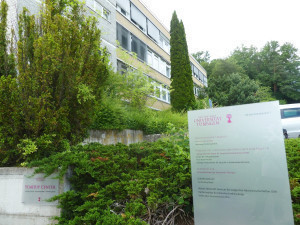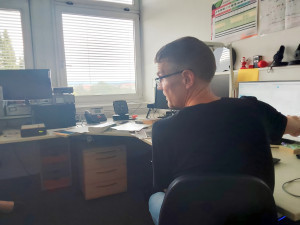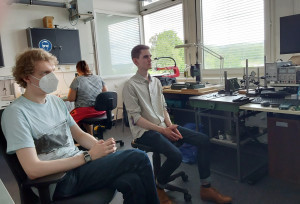A workshop on printed circuit boards and electronics production for young founders piqued our interest. Editor-in-chief Markolf Hoffmann signed up for a visit to the innovation lab at the University of Tübingen - and was not disappointed.
The Start-up Center at the Eberhard Karl University of Tübingen supports founders with various information events on their business ideas. These include a workshop on printed circuit board technology and electronics production by Dr. Andreas Krauß, who is responsible for the Start-up Center's innovation lab. I was able to take part in the workshop at the end of June.
The innovation lab is located outside the student-oriented city center of Tübingen. Nevertheless, interested parties regularly visit the university building 'Ob dem Himmelreich 7'. These are usually alumni shortly after graduating from university or students about to do so - in other words, in an exciting phase, the transition from education to professional orientation. This is where start-up ideas often bubble up and lead to innovative projects that testify to the creativity and daring of the young graduates. The Startup Center Tübingen enjoys a particularly good reputation here: in the ranking of the best universities for start-ups in 2022, compiled by the 'Top50 Start-Ups' platform (F.A.Z. Group), the Eberhard Karls University took third place [1]. A number of spin-offs from the university also won various start-up prizes [2].
Long waiting list for Innovation Lab workshops
 Innovation Lab 'Ob dem Himmelreich 7' in TübingenTheworkshops on product and prototype development in the Innovation Lab are extremely popular, and Dr. Krauß had to combine two separate events (electronics development and printed circuit board) in June due to limited capacity. As a rule, five to a maximum of ten participants are admitted; on this day in June, however, only three people took part. The midsummer temperatures may have been one reason, as the courses are normally booked out quickly - and the waiting list is long.
Innovation Lab 'Ob dem Himmelreich 7' in TübingenTheworkshops on product and prototype development in the Innovation Lab are extremely popular, and Dr. Krauß had to combine two separate events (electronics development and printed circuit board) in June due to limited capacity. As a rule, five to a maximum of ten participants are admitted; on this day in June, however, only three people took part. The midsummer temperatures may have been one reason, as the courses are normally booked out quickly - and the waiting list is long.
During my last conversation with Dr. Krauß, I had already learned that the founders often come from courses that are not related to electronics. This time, a neurobiologist, a physicist and an astrophysicist took part in the workshop - some of them recent graduates, others about to graduate. Their concerns are also different. The neurobiologist wants to continue her education in the innovation lab for a research project in the field of electronics; the two other participants are pursuing start-up projects (which they don't want to talk about, though - secret!). All three listened intently to Dr. Krauß, who took the risk of imparting basic knowledge of printed circuit boards, their design, manufacture and areas of application as well as other areas of electronics development in just under four hours.
From history to today's electronics production
From the very first second, the atmosphere was thick. Krauß began with a historical overview of electronics production and how electromechanics, conductors and semiconductors, insulators and transistors have developed. He then gave a market overview and pointed out the current and expected growth through 5G, home office and electric vehicles, for example, so that the workshop participants could assess the potential and importance of electronics manufacturing [3].
This was followed by a high-level - but compact - presentation of the process of electronics development, the 'design flow': from the concept phase to initial tests of early prototypes of a printed circuit board using breadboarding through to the design phase as the starting signal for a difficult project. Dr. Krauß used the example of electronic noses, which he himself helped to develop for many years [4].
In a kind of 'guerrilla research', a modern computer monitor that had broken in the laboratory building was also examined in order to illustrate the miniaturization of today's PCB structures and components (in comparison with their predecessors). Dr. Krauß emphasized the enormous importance of the miniaturization of volume - and thus costs - in PCB production, referred to microfine conductor technology (<50 µm), presented the 'NE555' integrated circuit, one of the 'most famous components ever', and touched on important aspects that need to be taken into account when designing electronics (EMC/ESD tests, legal requirements, CE seal).
The heart of electronic devices
 Dr. Krauß during the introduction to 'Fusion360'The printed circuit board as the 'heart' of every electronic device was dealt with separately and the current 'standard' (FR4 base material, single or multilayer printed circuit boards) was graphically illustrated. Dr. Krauß also showed how a printed circuit board can be produced 'quite simply' in the DIY process - and how this differs from high-volume industrial production, which is a constant topic at PLUS. Production and assembly processes at Würth, ASM, Sick and Eso Electronic were shown as examples. The Voltera 'V-One' 3D printer for printed circuit boards was used to explain milling and drilling, ink printing for switching and soldering paste and through-holes. Admittedly - a fast and hot ride through PCB production. However, the participants - new to the profession as mentioned - followed with great attention.
Dr. Krauß during the introduction to 'Fusion360'The printed circuit board as the 'heart' of every electronic device was dealt with separately and the current 'standard' (FR4 base material, single or multilayer printed circuit boards) was graphically illustrated. Dr. Krauß also showed how a printed circuit board can be produced 'quite simply' in the DIY process - and how this differs from high-volume industrial production, which is a constant topic at PLUS. Production and assembly processes at Würth, ASM, Sick and Eso Electronic were shown as examples. The Voltera 'V-One' 3D printer for printed circuit boards was used to explain milling and drilling, ink printing for switching and soldering paste and through-holes. Admittedly - a fast and hot ride through PCB production. However, the participants - new to the profession as mentioned - followed with great attention.
Dr. Krauß then moved on to the practical part of the workshop. The participants were able to try their hand at hand soldering on a circular PCB for an 'electronic roulette' - after ensuring ventilation to dissipate soldering fumes. There was also the opportunity to optimize a circuit board design using the CAD program 'Fusion360' or even to create a design themselves. As 'Fusion360' is available free of charge to educational institutions, Krauß pointed out the possibilities of the program, the extensive component library and the various 2D and 3D circuit views. However, this software aspect was almost intimidating in its complexity - the participants did not dare to get their hands on the computer and redesign the circuit board themselves. However, they did ask specific questions about the areas that are crucial to their own projects - sensor technology, specific components and solder connections. Accordingly, Dr. Krauß ended the workshop with a reference to numerous websites that could be helpful for deepening the content addressed in self-study.
Successful workshop despite the summer heat
 Workshop participants - the neurobiologist is already hand-solderingAt theend, not only the soldering wire was certainly smoking, but also many a head. However, it was impressive how the basics of PCB and electronics production were taught to 'newcomers' in a compact workshop. It was certainly an advantage that although the participants had no previous engineering knowledge, they were already familiar with the subject thanks to their university education. As founders, they can definitely build on this foundation. The knowledge of which skills they will need for their projects is undoubtedly valuable - and the fact that the Eberhard Karl University of Tübingen is offering this opportunity with the Start-up Center is thought-provoking: Particularly in times of a shortage of skilled workers, how can the basics be taught to those who are new and/or starting out quickly in the electronics industry, developing start-up ideas on their own initiative or coming into professional contact with PCB production? It might be worthwhile continuing to observe such concepts.
Workshop participants - the neurobiologist is already hand-solderingAt theend, not only the soldering wire was certainly smoking, but also many a head. However, it was impressive how the basics of PCB and electronics production were taught to 'newcomers' in a compact workshop. It was certainly an advantage that although the participants had no previous engineering knowledge, they were already familiar with the subject thanks to their university education. As founders, they can definitely build on this foundation. The knowledge of which skills they will need for their projects is undoubtedly valuable - and the fact that the Eberhard Karl University of Tübingen is offering this opportunity with the Start-up Center is thought-provoking: Particularly in times of a shortage of skilled workers, how can the basics be taught to those who are new and/or starting out quickly in the electronics industry, developing start-up ideas on their own initiative or coming into professional contact with PCB production? It might be worthwhile continuing to observe such concepts.
Weblinks
www.uni-tuebingen.de/forschung/innovation/startup-center/
www.autodesk.de/products/fusion-360/
www.top50startups.de
References
[1] 1st place: RWTH Aachen, 2nd place: TU Berlin. See also: www.top50startups.de
[2] See the StartUpCenter brochure: www.uni-tuebingen.de/forschung/innovation/startup-center/newsfullview-aktuelles/article/neue-broschuere-des-startup-centers/ (accessed: 1.8.2023).
[3] The major investments by Wolfspeed (see PLUS 2/2023, p. 146) and Intel are among the topics discussed; see the column by Heiko Weckbrodt in this issue (p. 1044)
[4] See p. 1008.





